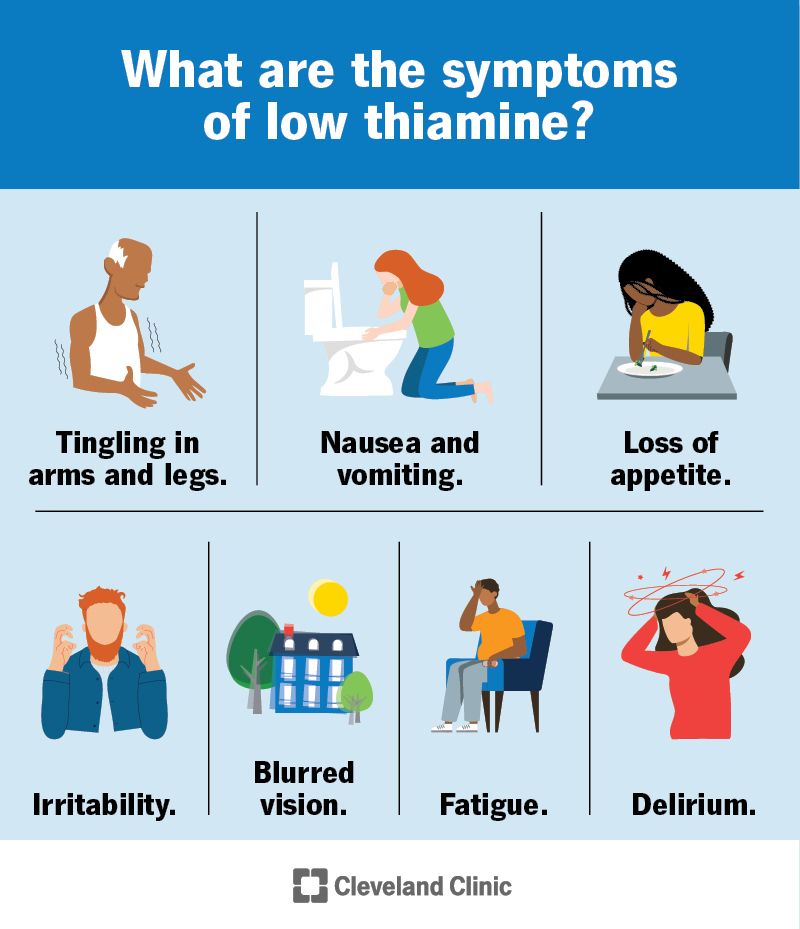Thiamine deficiency (vitamin B1 deficiency) can cause a range of symptoms, from fatigue to paralysis. It’s rare in areas with access to enriched foods and supplements. But people with certain medical conditions can still get it. When diagnosed and treated early, you can reverse most effects within a few months.
Advertisement
Cleveland Clinic is a non-profit academic medical center. Advertising on our site helps support our mission. We do not endorse non-Cleveland Clinic products or services. Policy

Image content: This image is available to view online.
View image online (https://my.clevelandclinic.org/-/scassets/Images/org/health/articles/thiamine-deficiency.jpg)
A thiamine deficiency means your body doesn’t have enough thiamine (vitamin B1) to function properly. Your body needs thiamine to stay healthy. Specifically, thiamine helps with cell function, growth, development and converting food into energy.
Advertisement
Cleveland Clinic is a non-profit academic medical center. Advertising on our site helps support our mission. We do not endorse non-Cleveland Clinic products or services. Policy
Consistently low thiamine levels can negatively impact your heart, immune system and nervous system. Symptoms like fatigue, loss of appetite and nerve damage can start in as little as three weeks.
Thiamine deficiency is rare in areas with regular access to food and supplements. But certain conditions can cause low thiamine even if you have access to these things. In the United States, most people with thiamine deficiency experience it as a symptom of another health condition.
The term “beriberi” refers to severe thiamine deficiency.
Thiamine deficiency symptoms may be vague, and they often mimic symptoms of other conditions. They can include:
Tell your healthcare provider if you develop any of these symptoms. They can run tests to determine the cause.
Causes of thiamine deficiency include:
Advertisement
Not getting enough thiamine in your diet can also cause thiamine deficiency. This can happen in people who mainly eat highly processed carbohydrates like white rice, white sugar and white flour. It also occurs in people with severe anorexia nervosa due to a lack of food intake.
A risk factor is something that increases your chance of developing a certain condition. Even though thiamine deficiency is rare, these things could raise your risk:
Babies who drink breast milk from parents with thiamine deficiency have a higher risk of developing it, too.
Left untreated, thiamine deficiency can lead to serious and life-threatening complications like:
A healthcare provider will do a physical examination and check for obvious symptoms. They’ll also run blood tests to confirm a diagnosis.
Providers can’t directly measure the level of thiamine in your blood. But they can check the activity of an enzyme called transketolase. Transketolase needs thiamine to work. So, if a blood test reveals low transketolase activity, it points to a lack of thiamine.
The only way to fix low thiamine is to get more of it into your system. Adults need between 1.1 to 1.2 milligrams of thiamine every day. Ideally, you can hit this quota by eating thiamine-rich foods. But if you have severe thiamine deficiency, you’ll need supplements to replenish your body’s stores.
Keep your thiamine levels healthy by eating foods like:
Sometimes, food isn’t enough to raise your thiamine levels quickly. You may need to take a supplement, too. Over-the-counter options include multivitamins or vitamin B complex formulas.
But you may need high-dose supplementation if you have a severe thiamine deficiency. Under medical supervision, a healthcare provider can give you thiamine in one of these forms, from least to most involved:
Advertisement
It depends on the severity of your condition and how long you’ve been deficient. For instance, some heart symptoms can go away within the first few hours or days. But nerve and motor symptoms can take up to six months to improve. In severe cases, nerve damage can be permanent.
Your healthcare provider will continue to supplement thiamine until your levels return to normal. This can look different for everyone, so it’s important to ask your provider what to expect in your situation.
When diagnosed and treated early, thiamine deficiency is reversible. Most symptoms should go away once your thiamine levels return to normal.
But in severe or untreated cases, thiamine deficiency can result in serious complications or even death.
The only way to prevent thiamine deficiency is to eat thiamine-rich foods. If you have a condition that affects your thiamine levels, be sure to manage it well and follow your provider’s recommendations. You should also see your healthcare provider for regular checkups.
You should see your healthcare provider any time you develop new or troubling symptoms. Even if your symptoms end up pointing to another condition, it’s important to get a diagnosis as soon as possible so you can start treatment.
Advertisement
Thiamine deficiency is rare in areas with prevalent food sources. If you live in an industrialized region, you probably don’t think much about thiamine because it’s in the foods you eat every day. But if you start to develop symptoms like fatigue, irritability or loss of appetite, tell your healthcare provider. You could have a condition that interferes with the way your body absorbs nutrients. They can find out why you developed sudden symptoms and recommend appropriate treatment.
Advertisement

Sign up for our Health Essentials emails for expert guidance on nutrition, fitness, sleep, skin care and more.
Learn more about the Health Library and our editorial process.
Cleveland Clinic’s health articles are based on evidence-backed information and review by medical professionals to ensure accuracy, reliability and up-to-date clinical standards.
Cleveland Clinic’s health articles are based on evidence-backed information and review by medical professionals to ensure accuracy, reliability and up-to-date clinical standards.
Cleveland Clinic’s primary care providers offer lifelong medical care. From sinus infections and high blood pressure to preventive screening, we’re here for you.
